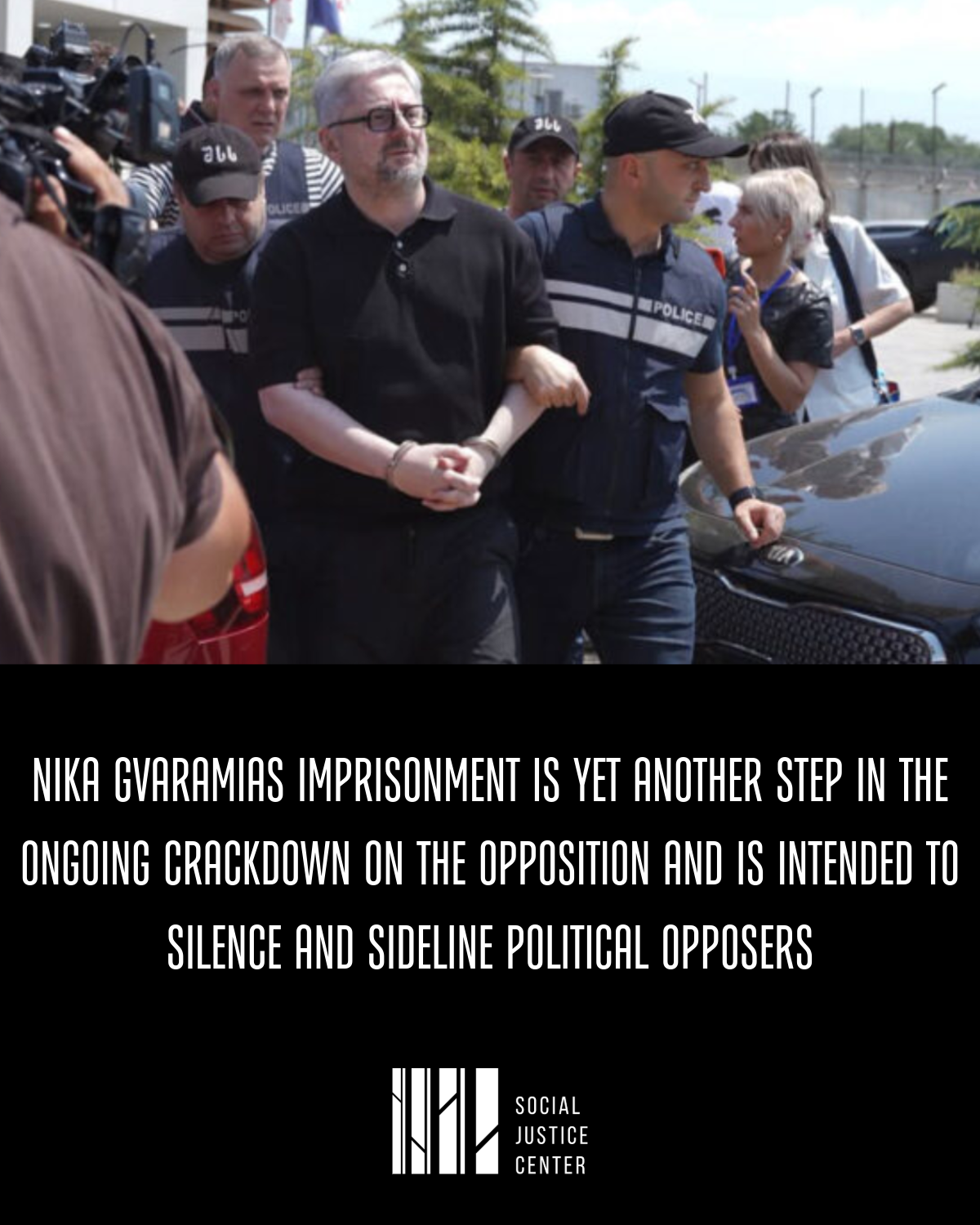საერთო ცხელი ხაზი +995 577 07 05 63


The Social Justice Center has responded to the imposition of the most stringent preventive measure, imprisonment, against opposition party leader Nika Gvaramia. We believe that the prosecution case and the court decision are both designed to punish a political figure and persecute opposition leaders.
The substantive hearing in the case of Nika Gvaramia commenced at Tbilisi City Court on June 13, 2025. Judge Jvebe Nachkebia sustained the prosecution's motion and substituted pre-trial detention for the 30,000 GEL parole that had been previously imposed as a preventive measure on the leader of the political party 'Akhali' during the hearing. It is also important to note that the presiding judge, Jvebe Nachkebia, has a prior conviction for an official misconduct offence, according to the information provided by Gvaramia's counsel. The defense contends that this conviction may have been used as a tactic to exert influence over him. Nika Gvaramia is accused by the Prosecutor's Office of Georgia of violating Article 349 of the Criminal Code of Georgia by failing to appear before a provisional parliamentary investigative commission. Gvaramia was initially released on parole in April of this year as a preventive measure. However, due to his failure to pay the bail, the Prosecutor’s Office requested that pre-trial detention be imposed.
It is widely known that, the Parliament led by 'Georgian Dream' established an interim fact-finding commission on February 5,[1] chaired by Tea Tsulukiani, to examine the activities of the government and its officials in power between 2003 and 2012. The charges brought against Nika Gvaramia are based on his failure to appear before the commission. The 'Georgian Dream' placed the issue of prosecuting and banning the 'United National Movement' party on the political agenda even prior to the 2024 elections. Consequently, investigating a former government’s actions thirteen years after its term ended raises serious doubts as to whether the process serves a legal purpose or instead constitutes an act of political retribution.
Furthermore, the legal framework that governs the accountability of individuals who fail to appear before a temporary parliamentary investigative commission is highly flawed and problematic. Particularly, both Article 349 of the Criminal Code of Georgia and Article 173³ of the Code of Administrative Offenses address the identical conduct, noncompliance with a request issued by a parliamentary commission, and contain essentially overlapping legal content. This parallel criminalization under two legal codes gives rise to a normative conflict, whereby a single act may be prosecuted either as an administrative offense or as a criminal offense, without any clear or objective criteria to guide the differentiation. In this scenario, there is no foreseeable or objective criterion that differentiates between an administrative and a criminal offense. Consequently, citizens, including political actors, are unable to foresee the legal repercussions of their actions, even when they act with due diligence. Consequently, the offense that is criminalized under Article 349 of the Criminal Code is unforeseeable and should be regarded as unconstitutional. Additionally, according to general principles of criminal law, when faced with such legal conflicts or ambiguities, courts must apply the norm that is more favorable to the accused and imposes the least restriction on personal liberty.
Nika Gvaramia is not the first political figure to face criminal proceedings for non-appearance before a temporary parliamentary investigative commission. Leaders of the political party 'Lelo', Mamuka Khazaradze and Badri Japaridze, have each been ordered to post bail in the amount of 50,000 GEL. Politician, Irakli Okruashvili was placed in pre-trial detention due to non-payment of bail. In May, Zurab 'Girchi' Japaridze, a leader of the 'Koalitsia Tsvlilebebistvis' ('Coalition for Change'), was similarly detained for a failure to post bail. Shortly thereafter, another coalition leader, Nika Melia, was also placed in pre-trial detention, following an unlawful administrative arrest prior to a change in the imposed preventive measure. Nika Gvaramia is now the third leader of the coalition to be imprisoned by the 'Georgian Dream' government.[2]
Recently, the trend of imprisoning political party leaders has reached an alarming point. A significant number of the country’s opposition figures now hold the status of criminal defendants, often in relation to acts whose criminal nature is, at the very least, highly questionable. It is evident that Georgian Dream is acting with the aim of intimidating and persecuting the opposition and critical voices. The use of criminal law mechanisms for political purposes to neutralize opponents clearly signals an attempt to establish consolidated authoritarianism and eliminate dissenting opinion.
The recent pattern of imprisoning political party leaders has reached a troubling peak. A considerable number of opposition figures across the country now face criminal charges—often for actions whose criminality is, at best, highly debatable. It appears that Georgian Dream is pursuing a deliberate strategy of intimidation and persecution targeting political opponents and critical voices. The instrumentalization of criminal law for political ends clearly signals an attempt to establish consolidated authoritarianism and eliminate dissenting opinion.
[1] The Parliament established the "Temporary Investigative Commission of the Parliament of Georgia to Examine the Activities of the Regime and Political Officeholders in Power During 2003–2012." Available at: https://cutt.ly/FrQmaSTu.
[2] Georgian Young Lawyers’ Association (GYLA) responds to the legitimacy of the “Georgian Dream” investigative commission and the ongoing criminal cases related to summons issued by the commission. Available at: https://cutt.ly/1rQmppVP
The website accessibility instruction